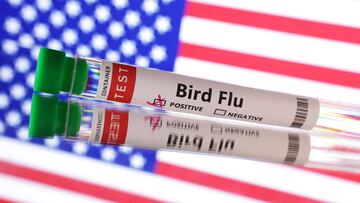What are the main differences between bird flu and regular flu?
A look at the main differences between the bird flu and the traditional flu, as explained by the CDC.


This year, the CDC has recorded sixty-one human cases of Bird flu, also known as avian flu.
Earlier this week, the CDC reported the first severe infection that required hospitalization after an individual in Louisiana contracted the virus. The H5N1 virus, commonly called “bird flu,” can be transmitted from birds or marine mammals to humans, but there are currently no known instances of human-to-human transmission.
After dairy cows in California tested positive for the virus, the state announced a public health emergency that grants the relevant authorities and agencies more powers to prevent the further spread of the virus.
CDC plans to conduct enhanced, nationwide summer monitoring to help detect even rare human cases of #H5N1 in the community, in addition to raising awareness about H5N1 via targeted outreach to farmworkers in affected communities. More #birdflu updates: https://t.co/lFsVWsHvLw pic.twitter.com/3gWoZQJkAI
— CDC Flu (@CDCFlu) May 31, 2024
How does the bird flu differ from the regular flu?
Unlike the traditional flu, which can cause up to 41 million infections a year, the CDC says that “cases of human infection” are “rare.” Though obvious, the low number of infected humans stems from the fact that the H5N1 virus primarily impacts birds, exemplified best by its name. Additionally, how the H5N1 virus affects the human immune system is difficult to understand, as some infected report no symptoms. At the same time, it can be fatal in other cases.
What are the symptoms of the bird flu in humans?
- Cough
- Diarrhea
- Difficulty breathing
- Fever
- Headache
- Muscle pains
- Runny nose
- Sore throat
The flu that most of us have had at some point in our lives is contracted through exposure to an infected person through droplets in the air or touching an infected surface. The bird flu can be contracted “through an intermediary animal,” reports the CDC, but the most common way people contract the virus is through “close or lengthy unprotected contact (i.e., not wearing gloves or respiratory protection or eye protection) with infected birds or places that sick birds or their saliva, mucous, and feces have touched.”
Finally, unlike the regular flu, there is no vaccine for bird flu. The flu season in the United States typically lasts from October to May. If you want to reduce the chance of getting sick during this period, you can get a flu shot.
Complete your personal details to comment